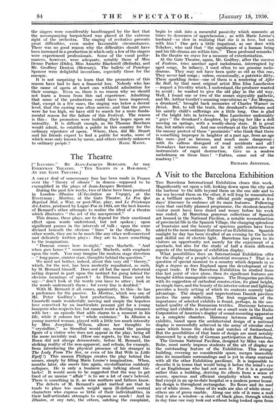The Theatre
[" ILLUSION." By JEAN-JACQUES BERNARD. AT THE EVERYMAN THEATRE. " TEN NIGHTS IN A BAR-R003I." AT THE GATE THEATRE.] A GREAT deal of unnecessary fuss has been made in France over the " theory of silence " in drama—supposed to be exemplified in the plays of Jean-Jacques Bernard.
During the past few weeks, two of these have been produced in London—illusion (L'Invitation au Voyage), at the EverymanMartine, at the Gate Theatre. Le Feu Qui Reprend Mal, a War, or post-War, play, and Le Printemps des Autres, produced by Lugne-Poe in 1924, are the best known of Bernard's other attempts to realize the ideal of a theatre which illustrates " the art of the unexpressed."
This drama, these plays, are to depend for their emotional effect upon words understood, but not spoken ; upon significant pauses in the intervals of talk ; upon the sense divined beneath the obvious " lines " in the dialogue. In other words, they are to be much like any other well-conceived and delicately written plays : they are to leave something to the imagination.
" Duncan comes here to-night," says Macbeth. " And when goes hence ? " murmurs Lady Macbeth, with emphasis upon the verb. You may imagine the modern stage direction —" long pause, sinister stare, thoughts behind the question."
We need not bother, indeed, about this very old " theory," which, for the rest, has been modestly repudiated, as such, by M. Bernard himself. Does not all but the most rhetorical acting depend in part upon the instinct for going behind the obvious meanings of speech ? As Eleonora Duse used to say—" don't look at the words you have to utter ; look at the words underneath them : for every line is doubled."
With M. Bernard it all comes, apparently, to this—he has a preference for the passive. In Martine, which was one of Mr. Peter Godfrey's best productions, Miss Gabrielle Casartelli made wonderfully moving and simple the hopeless love conceived by an inarticulate peasant girl for a young bourgeois who respects her, but cannot resist a fleeting romance with her : an episode that adds charm to a moment in his life, while it colours her whole existence." In Illusion a young married woman, played with a little too much intensity by Miss Josephine Wilson, allows her thoughts to crystallize," as Stendhal would say, round the passing figure of a visitor who does not appear in the play, being all the more invisibly real. (How one regrets, by the way, that Ibsen did not always demonstrate, before AL Bernard, the striking reality of the non-apparent, and refrain, for example, from introducing the physical presence of his stranger in The Lady From The Sea, or even of his Rat Wife in Little Byolf !) This unseen Philippe creates the play behind the scenes, simply by filling Marie Louise's imagination. When, months later, she meets him again, crystallization suddenly collapses. He is only a business man talking about tin- tacks! It would seem to be suggested that the way to get tired of an unwise " affair" is to see a lot of one's beloved. There is something in it, as wise mothers and fathers know.
The defects of M. Bernard's quiet method are that he tends to place too much weight upon ill-defined central characters who express so little of their individualities, in their half-articulate attempts to express so much I And in Illusion, at any rate; the others, catching the complaint,
begin to sink, into A mournful passivity which amounts at times to denseness of apprehension ; as with Marie Louise's husband—so slow in realizing that she is in love, but not with him ! One gets a• little impatient, as one does with Tchekov, who said that " the significance of a human being and his life-drama are within him. These profound remarks ! In the theatre we crave for a measure of exteriorization.
At the Gate Theatre,- again, Mr. Godfrey, after the success of Fashion, tries another aged melodrama, interrupted by aged songs. In infancy, I used often to see genuine melo- dramas. They may not have been quite as old as this one. They never had songs ; unless, occasionally, a patriotic ditty. These sparkling items—one of them is a rendering of After the Ball, by that most original artist Miss Elsa Lanchester —impart a frivolity which, I understand, the producer wanted to avoid : he wanted to give the old play in the old way. Well, I found one or two of the scenes enjoyably pathetic, and Mr. Arthur Goullet's amazing convulsions as "Joe Morgan, a drunkard," brought back memories of Charles Warner in Drink. But, to tell the truth, the drunkard's delirium and his saintly child's sufferings are a little long. One is glad of the bright bits in between. Miss Lanchester undeniably " guys " the drunkard's daughter, by playing her like a doll moving on springs, with a woolly-sheep stare. It is great fun, but rather cruel. And .one overhears at the Gate Theatre the uneasy protest of those "pessimists" who think that there is something improper in laughter at a past age, from an age like ours—just as fatuous, and much more dangerous ; with its callous disregard of road accidents and all Nowadays bar-rooms are not in it with motor-cars as instruments of rapid destruction. Give us a modern melodrama on those lines ! " Father, come out of the roadway I "
RICHARD JENNINGS.






































 Previous page
Previous page